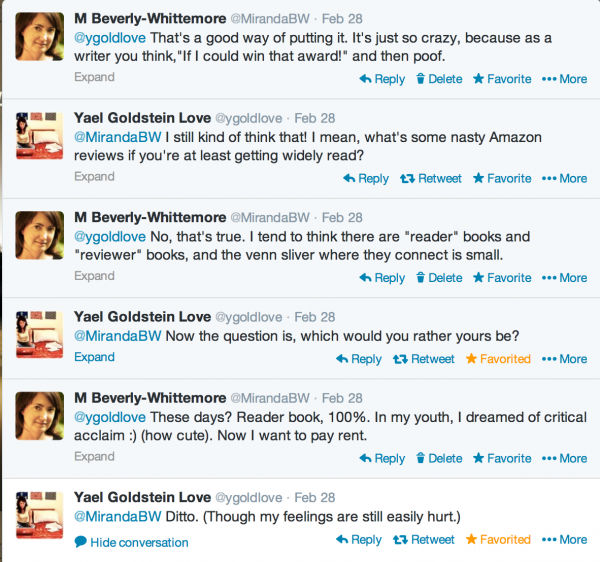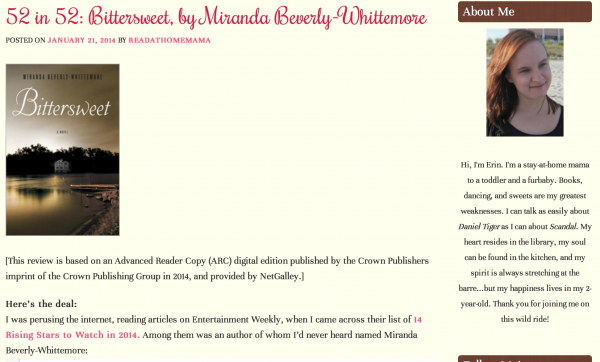This is part of the Bittersweet Book Launch case study, where Dan Blank and Miranda Beverly-Whittemore share the yearlong process of launching her novel. You can view all posts here.
By Miranda Beverly-Whittemore
The other day on Twitter, my friend Yael posted about a recent study that found, to quote this article, that “winning a prestigious award not only garners more attention for a book, but also more negative reviews.” Here’s the exchange that article prompted:

What I (usually) like about Twitter is that it goes straight for the jugular. In person I don’t think I would have said out loud: “These days? Reader book, 100%. In my youth I dreamed of critical acclaim.” Not because I’d be embarrassed to admit to that, but because there’s something about 140 characters that can act as a kind of truth serum, and distill beliefs that I didn’t even know I had.
Once I said it, I started thinking about how much writing and publishing Bittersweet is changing my attitude about my career. When I wrote my first two books, I was definitely aware that I was precocious. I was very young, and very driven, and in this culture that often means that someone like who I was then gets serious extra credit. And I did- major book deal, lots of big talk. It was an insidious cycle- because once I’d been given the stamp of approval, I kind of just assumed that people would want to read whatever I wrote, and that meant I believed I deserved the stamp of approval unconditionally.
It’s awful to see it written out so blatantly, but I think now I can finally own up to that assumption.
Yes, I wrote The Effects of Light and Set Me Free because they were surging to get out of me. But I also had a clear belief in the fact that I belonged in the place I’d found myself- in a big-time book contract- and when I didn’t get the critical acclaim (or, let’s be honest, much critical notice at all), I was totally floored/stunned and utterly thrown off balance. I didn’t know who I was as a writer, and part of that was because I’d been driven to write by a striving, hungering need for that next stamp of approval (critical, saleswise) that would make me feel even more accomplished.
The years that came after publishing Set Me Free definitely humbled me and required me to take a step back from the idea that a stamp of approval means much, except in how I choose it to give me meaning.
Two and a half years ago, when I sat down to write Bittersweet, the drive to do so, first and foremost, came because I wanted it to write something readable. Readable- what does that mean? Well, I wanted to create the delicious experience for someone else that I’ve had with a handful of books- the “I can’t put it down, I can’t come to the dinner table, I can’t go to sleep” addictive rush when a book sucks me in. Yes, I had a dream that a book that was that readable would sell to a publisher, and appeal to that publisher to promote- but most of that ambition was in the interest of finding a reader who was like me- of giving her a gift.
Necessarily, I’ve changed my thinking about reviews. Yes, they are necessary, yes, I will read them, yes, some of them will still probably hurt my feelings a bit. But critical acclaim or disdain pales in comparison to that reader out there who says, “I loved this book!” Because she’s who I’m writing for. There were a number of readers who said that to me about The Effects of Light and Set Me Free, and I’m ashamed to admit I didn’t much listen to them, because my sights were set in the wrong direction. But to all those readers who boosted me through my early careers, I say thank you, and I apologize. It’s you I’m writing for. The you who my books have already found, and the you I haven’t met yet.

